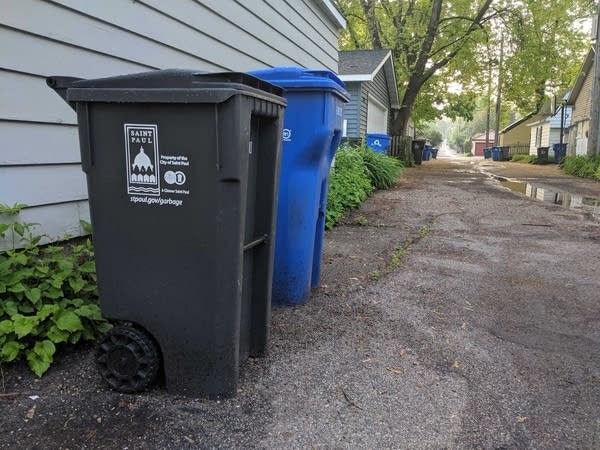When Minnesota cities take over trash collection, they take heat. But sometimes it pays off

Go Deeper.
Create an account or log in to save stories.
Like this?
Thanks for liking this story! We have added it to a list of your favorite stories.
There's an ongoing battle in Minnesota over the freedom to decide who hauls your trash away. City officials in St. Paul plan to appeal a decision that puts its organized trash program in limbo. Like St. Paul, some Minnesota cities have struggled to control trash collection, but others have made it a part of their broader efforts to help the environment.
When the city of Maplewood organized its trash collection in 2011, the dozen or so haulers who had been serving city residents fought back. A City Council member who pushed for the change lost his seat. But the plan went through.
Now Mayor Marylee Abrams said the system "works great. It really is a non-issue."
She said residents have gotten used to it and it's saving them money. And city officials see organized trash collection as a way to make progress on broader sustainability goals.
Turn Up Your Support
MPR News helps you turn down the noise and build shared understanding. Turn up your support for this public resource and keep trusted journalism accessible to all.
For instance, in the city's next trash contract, Maplewood may add residential organics recycling and pay-as-you go pricing that rewards people for minimizing their trash.
"Everyone has been pleasantly surprised because what started off being rather controversial and splitting our community is now really an issue that no one even talks about," Abrams said.
Sauk Rapids is another city that saved its residents money by getting organized, said Craig Johnson of the League of Minnesota Cities.
"They saw a reduction in solid waste costs so big that the council members who had opposed it ended up saying 'we were wrong,'" Johnson said.
Sauk Rapids was even able to negotiate a provision in its contract that says seniors don't have to wheel their carts out the curb — the pickup crews will do that for them.
Johnson said disputes in St. Paul and Bloomington aren't the norm.
"What we have seen is that in other communities, if they decide that organized collection is the direction they want to go, they can usually find a path to get there and a way that will at least bring the haulers down to a, I-guess-we-can-work-with-this, level," he said.
A change in state law in 2013 was designed to make it easier for cities to go that route, Johnson said.
The city of St. Anthony organized its trash collection after the new law took effect and worked out with three different haulers a way to make the system efficient without taking away anyone's market share, St. Anthony city manager Mark Casey said.
"Overall it was a smooth process. We were able to sit down and have a frank conversation with our three collectors," he said. "We estimated about 80 percent of the residents saved money and about 20 percent fees went slightly up."
A study by the Minnesota Pollution Control Agency prior to the law change found that residents in cities with organized trash collection paid less. Still, only about 30 percent of Minnesota cities have organized collection, compared with 70 percent nationwide, said Peder Sandhei, a solid waste planner with the agency.
"The way our laws are set up in Minnesota has created this weird dynamic where we're kind of the inverse of most communities," Sandhei said.
Besides cost, there are other benefits of organized collection the study identified: less wear and tear on roads, lower fuel consumption and reduced emissions. Illegal dumping or residents sneaking their trash bags into dumpsters that someone else is paying for can also be a problem when there's no organized city collection.
"And they're costs that residents don't tend to notice," Sandhei said.
Sandhei added it's much easier for people to see changes in their monthly garbage bill. But in observing several trash hauling controversies over the years, Sandhei found cost is just part of the equation. It's also about principles.
"People don't like the idea of government deciding who their garbage hauler is," he said.
Roseville and Fridley dropped their attempts to organize trash collection in recent years. Where Bloomington and St. Paul will land with their programs could be decided in court.



